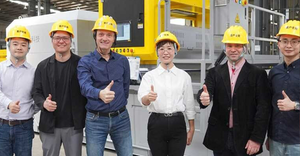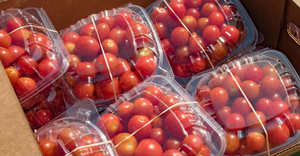The EvoBin sits in high-traffic venues to help educate consumers about how to sort their waste.
With states and municipalities implementing increasingly aggressive diversion goals, getting consumers to toss the right items in the correct bins is a key component of reducing what ends up in landfills.
With rules sometimes being different from state to state, town to town or, even, building to building, confusion can reign. As a result, high-traffic venues often substantially overspend on waste collection, contamination fines and additional labor to pre-sort before collection. A Seattle-based start-up company is hoping to take the guesswork out of waste sorting and disposal through the introduction of its version of a “smart bin.”
EvoEco, founded in 2015, creates smart-building technology solutions and has developed its flagship product, the EvoBin, which is a smart waste bin that sits in high-traffic venues to help educate consumers about how to sort waste. The bin’s initial launch is with Columbia Property Trust at 221 Main Street in San Francisco.
“We have tried a number of programs to encourage our tenants and visitors to sort their waste appropriately, since this not only supports our environment but can also provide significant savings on our waste disposal costs. However, our diversion rates were still below our target average,” Nicole Dubee, property manager for Columbia Property Trust, said in a statement. “We are finding that, with its unique, interactive digital screen, the EvoBins engage people in a way that causes them to stop, consider and sort items correctly. Increasing our diversion rates should enable us to not only make up the cost of the bins in less than three months but also realize as much as a 40 percent savings year-over-year on our waste bill.”
Each EvoBin is equipped with an integrated scale that detects when waste is tossed in. The change in weight triggers a responsive message that slides, scrolls, or pops onto the screen. When users discard their waste, all weights in all bins are recorded and the screens provide immediate feedback.
When not in direct use, the digital screens show a cascading stream of waste, with images of items falling into the correct bins. This waste data can be monitored over time—and communicated on-screen—to encourage participation in communal recycling and composting.
“We're all about creating a simple and empowering user experience,” says William Zhou, CEO of EvoEco. “When you walk up to the bins with trash, you’ll see scrolling loops (instead of the traditional paper signs or 3D boards of waste items) of items specific to your location which can help figure out which bin they belong in. When you toss your waste in, our bins talk back to you. We have a weight scale at the bottom that detects that you dropped something in and triggers a custom message to you. This message can be anything and changes often, from thanking you for your effort and informing you on your environmental contribution, to a specific message the location wants to let you know.”
EvoEco is not the only company attempting to crack this market.
Bin-e is a device that can recognize, categorize and sort waste. Its functioning is based on a combination of mechanical, electronic elements and software with elements of artificial intelligence.
CleanRobotics recently made it to the second round of the Watson AI XPrize. The company is in the top 5 percent of teams who initially applied to participate in the multi-million dollar prize.The company’s TrashBot utilizes a variety of sensors, robotics and artificial intelligence (AI) in order to detect what a piece of waste is, classify it as recyclable or not, then separate the item into the correct receptacle.
“This is because of the technology we have developed in which we are able to recognize and sort waste with 80 percent accuracy,” says Tanner Cook, co-founder and vice president of engineering for CleanRobotics.
The firm is deploying units to Vicinity Centres in Australia and the Pittsburgh International Airport in the coming weeks.
And Needham, Mass.-based Bigbelly Inc.’s smart waste and recycling system is comprised of smart, sensing waste and recycling stations as well as a centralized web-based software platform. The stations communicate real-time fullness status directly into the CLEAN software platform, or the management console. Auto-generated email, text, and online notifications indicate which stations need to be collected to drive increased productivity while eliminating overflows and unnecessary collections.
“Today, Bigbelly is a multi-purpose platform and a key piece of infrastructure used for building smarter cities,” says Leila Dillon, vice president of marketing and North American distribution for Bigbelly. “Uniquely positioned, the company offers a solution that modernizes the core city service of waste collection, while providing a multi-purpose platform that can also host smart city solutions and communications infrastructure.”
Meanwhile, each EvoBin has a small cameras inside that is identifying what's being thrown away. In the future, the bins will be able to correct people and let them know proactively about where their trash needs to go.
“Our bins actually have an identity, there's a user experience. They're fun, and the bins talk back to you and the messages have a personality to them,” says Zhou. “As we're launching to more and more locations, you can expect to see that unique interaction whether at your workplace or at a shopping mall. Plus, we've got some very cool machine vision tech behind it.”
The EvoBin also is a live waste data platform for operators, helping them understand their diversion rates, and how much waste people are throwing away at specific locations.
Based on waste audits EvoEco has conducted in different locations, the company has seen a reduction in contamination of up to 50 percent, and a 25 percent increase in waste diversion. High traffic sites that have multiple bins should start seeing a reduction in their waste bill, according to Zhou.
“I think there's currently quite a few companies that are trying to pioneer the smart building technology industry,” he says. “Smart homes are happening, but smart buildings are still further behind. Building operators are focused on optimizing energy, water, and waste. We're the first live waste data platform. We're not just another trash-bin company, we're also trying to make waste high-tech and sexy and change the way that people think about waste. I can't emphasize that enough.”
About the Author(s)
You May Also Like


